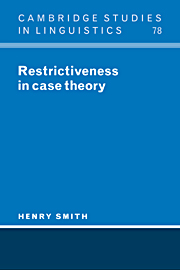5 - Icelandic
Published online by Cambridge University Press: 04 November 2009
Summary
In this chapter I will provide an analysis of some central problems in Icelandic syntax within the theory developed so far. I would like to follow out one of the consequences of the theory in the last chapter, that of the possibility of double linking. If, as argued there, obliqueness and non-obliqueness (represented by [±obl]) is introduced to NPs through the linkers that link them, then the possibility of lexical case and word order doubly linking NPs is predicted. Just this double linking, I will argue, is the best way to explain the well-known combination of rich case and relatively strict word order in Modern Icelandic. In the next chapter, I will provide a diachronic explanation of the rise of Modern Icelandic double linking.
The essence of the analysis I propose is that lexical case in Icelandic does not carry the [+ obl] feature specification and that Icelandic is type 1. If the lexical cases are not oblique, they will be non-oblique by default, and so it follows that the lexically cased NPs will behave as terms. This will be true whether or not there is a word-order position to link them as well. I will argue that preverbal or pre-VP position is the only positional linker in Icelandic. Subjects, then, will typically be doubly linked, but objects will not. Finally, the approach advocated here will provide a predictive account of the interaction of case, passivization, and coordination.
Case, agreement, and word order
Icelandic was the first language considered in Chapter 2. There I provided an analysis of case in Modern Icelandic, and illustrated the basic workings of the theory using Icelandic data.
- Type
- Chapter
- Information
- Restrictiveness in Case Theory , pp. 171 - 220Publisher: Cambridge University PressPrint publication year: 1996



